高中英语必修一课件
高中英语必修一人教版:Unit 1 建议信课件 课件

Besides, keeping a dairy is also a good choice, as it can improve your writing skills. I hope you will find my suggestions helpful and useful and make great progress in Chinese. Yours, Li Hua
Dear Peter, I'm glad that you are interested in learning Chinese and I would like to offer you the following tips. To begin with, it is a good idea to make more Chinese friends in you daily life. You can pracice your spoken Chinese with them. What's more, it would be wise to listen to Chinese songs and watch Chinese movies. They can make you have a better understanding of Chinese culture.
开头句: 1. 我知道你在....方面有困难,我想给你提如下 一些建议。 I have known that you have some trouble (doing sth) and I would like to give/offer you the following suggestions. 2. 当涉及/关于...,我的建议如下。 When it comes to/As for .. the following are my suggestions. 3. 我写这封信的目的是给你一些建议。 I'm writing to give you some suggestions/ advice/tips.
新人教版高中英语必修一unit 3 workbook 课件

2 Which sports record is stated in each sentence? Fill in the blanks to find out.
Using Words and Expressions
Complete the sentences with the correct forms of the phrases below.
at home and abroad come along even though learn from one’s failures
7 I hope you can come to our party after the final game, and please feel free to invite a friend____to__c_o_m_e__a_lo_n_g____if you like. 我希望你能在决赛后来参加我们的聚会,如果你愿意, 可以邀请朋友一起来。
feel free to: 随意做...
8 If you could choose to remember only six words in your life, remember these: never__lo_s_e__h_e_a_rt_/_g_iv_e_u_p___. Keep trying.”
2 The greatest number of rounds in a__b_o_x_in__g__match was 276 when Jack Jones beat Patsy Tunney in Cheshire,England, 1825.
人教版高中英语 必修一 Unit2 《English around the world---Reading》 课件 (共27张ppt).ppt
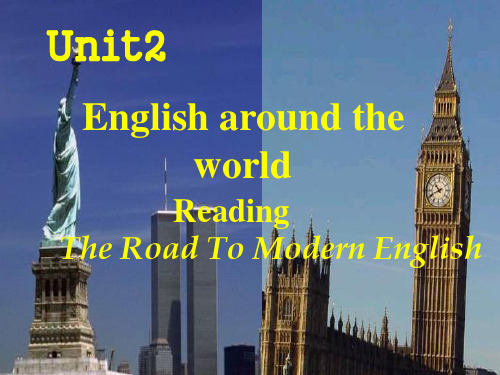
Conclusion
Language can change with time.
Language can change
time
when cultures
communicate with
each other.
place
Some people say that Chinese is a much more elegant language, so it is more important for us to master it and it is not so necessary to master foreign language. Do you agree with this opinion and why?
Noah Webster Born: October 16, 1758 Died: May 28, 1843 When Noah was 43, he started writing the first American dictionary. He did this because Americans in different parts of the country spelled, pronounced and used words differently.
3 ____ will tell if Chinese English develop its own identity. A time B people
Thinking
Will Chinese English become one of the world Englishes?
“Only time will tell”.
Choose the main idea of the text.
人教版高中英语必修一《Friendship》课件
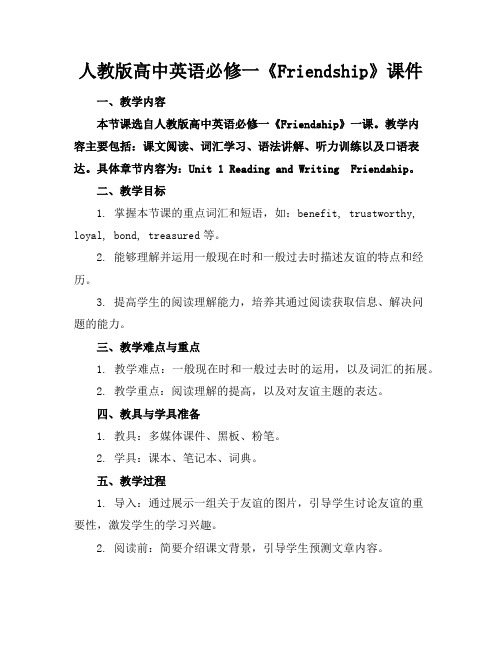
人教版高中英语必修一《Friendship》课件一、教学内容本节课选自人教版高中英语必修一《Friendship》一课。
教学内容主要包括:课文阅读、词汇学习、语法讲解、听力训练以及口语表达。
具体章节内容为:Unit 1 Reading and Writing Friendship。
二、教学目标1. 掌握本节课的重点词汇和短语,如:benefit, trustworthy, loyal, bond, treasured等。
2. 能够理解并运用一般现在时和一般过去时描述友谊的特点和经历。
3. 提高学生的阅读理解能力,培养其通过阅读获取信息、解决问题的能力。
三、教学难点与重点1. 教学难点:一般现在时和一般过去时的运用,以及词汇的拓展。
2. 教学重点:阅读理解的提高,以及对友谊主题的表达。
四、教具与学具准备1. 教具:多媒体课件、黑板、粉笔。
2. 学具:课本、笔记本、词典。
五、教学过程1. 导入:通过展示一组关于友谊的图片,引导学生讨论友谊的重要性,激发学生的学习兴趣。
2. 阅读前:简要介绍课文背景,引导学生预测文章内容。
3. 阅读中:引导学生阅读课文,完成相应的阅读任务,如:回答问题、填空、判断正误等。
5. 词汇讲解:结合课文内容,讲解重点词汇和短语,引导学生进行词汇拓展。
6. 语法讲解:讲解一般现在时和一般过去时,通过例句和练习进行巩固。
7. 听力训练:播放与友谊相关的听力材料,让学生完成相应的练习。
8. 口语表达:设置情景,让学生运用所学知识进行口语表达。
六、板书设计1. Friendship2. 重点词汇和短语:benefit, trustworthy, loyal, bond, treasured等。
3. 语法:一般现在时和一般过去时。
4. 友谊的特点和表达。
七、作业设计1. 作业题目:(1)根据课文内容,用一般现在时和一般过去时描述你的一个朋友。
(2)写一篇关于友谊的短文,不少于80词。
2. 答案:(1)My best friend is loyal and trustworthy. We have known each other since primary school. We often spend timetogether, chatting and sharing our happiness and sadness. (一般现在时)(2)I met my best friend in middle school. We were in the same class and often helped each other with our studies. Although we are now in different schools, we still keep in touch and treasure our friendship. (一般过去时)八、课后反思及拓展延伸1. 反思:关注学生在课堂上的表现,及时发现问题,调整教学方法,提高教学效果。
高中英语必修一《Unit 1 A new start Starting out Understanding ideas》课件
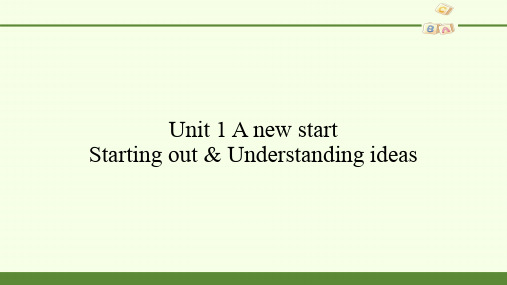
○31 too...to...太……而不能 ○32 pay attention 专心,注意 ○33 embarrassed adj. 尴尬的 ○34 relaxed adj. 放松的 ○35 well done 干得好 ○36 challenge n. 挑战 ○37 like prep. 像 ○38 put sb under pressure 使某人处于压力之下
(10) With butterflies in my stomach, I breathed deeply. " Hi, I' m Meng Hao. " Everyone started laughing. I looked at them in panic. " Nice to know (11) we share the same name, " said my new teacher. I had been too nervous to pay attention when he introduced himself! (12) Although I was embarrassed, his words made me a lot more relaxed!
Unit 1 A new start Starting out & Understanding ideas
1
Part Ⅰ Starting out & Understanding ideas
My First Day at Senior High
(1) After I had pictured it over and over again in my mind, the big day finally arrived: my first day at senior high! I woke up early and rushed out of the door in my eagerness (2) to get to know my new school.
人教版高中英语必修一Unit3TravelJournal单词讲解课件(共23张PPT)

课文语法填空
Wang Wei and I have dreamed about taking a great bike trip.She persuaded me 1._t_o_b_u_y___(buy) an expensive mountain bike,and she soon got our two cousins 2.____i_n_te_r_e(sitnetderest) in cycling too.
8. __a_t__m__i_d__n__ig__h__t_______ 在午夜 9. __g_r__a_d__u_a__t_e__f_r_o__m_____ 毕业于 10. _p__u__t_u__p_______________张贴;搭建 11. _f_o__r__o__n_e___th__i_n__g_._._._fo__r___a__n__o_t_h__e_r_____ 一方面……,另一方面…… 12. _c_a__n_’_t_/_c_a__n__h__a__r_d_l_y__w___a_i_t__to___d__o__s_t_h_ . 迫不及待地做某事
d我ete已rm决in定e 毕on业/u后po定n 居决在定北京。
determine
(单句语法填空) ①Whether a person can succeed or not __i_s_d_e_t_er_m__i_n_e_d(determine) by many factors.
determine vt.& vi.决定;(使)下定决心
on
his
face
showed
that
he
had
endoeutgehrmcoinnfeiddenacdej.in坚hi决ms的el,f. 有决心的
浙江省杭州市西湖高级中学人教版高中英语必修一:Unit1Friendship课件

4. He called the police because he _w_a_s_c_o_n_c_e_r_n_e_d__a_b_o_u_t Mary’s safety. (关心 )
5. I can’t p_a_y__f_o_r the books now. XXX you bill me (for them) later? (付款 )
Anne's famliy
Anne’s father : Otto Frank
Anne’s older sister: Margot
Anne’s mother: Mrs. Frank
Anne Frank
Peter, who lived with the Franks in the attic
Background
3. cheat in the exam考__试__作__弊_ 4. look at someone else’s paper
_看__别__人__的__卷__子______ 5. make a list _列__单__子_ 6. 上课 _g_o__to__c_la_s_s_ 7. 参加期末考试 t_a_k_e__th_e__e_n_d_-_o_f-_t_er_m___ex_a_m_
6. Jim broke away from his friends, saying “I _h_a_v_e_g_o_t__to_ hit the books.” (不得不)
III. 英汉互译。 1. walk the dog _遛__狗___ 2. go on holiday _去__度__假_
13+ points: You are an excellent friend who knows that to be a good friend you need to bXXXce your needs and your friend’s needs. Well done!
《高中英语必修一全册课件》

Critical Thinking
Develop critical thinking skills by analyzing texts, identifying logical fallacies, and evaluating evidence and arguments.
Literature
Genres
Explore a range of literary genres including drama, poetry, and short fiction, and learn how to analyze literary devices such as symbolism and imagery.
Idioms and Expressions
Learn common idioms and expressions that are used in English, and improve your ability to communicate with native speakers.
Grammar
《高中英语必修一全册课 件》
An engaging and comprehensive presentation on the various aspects of high school English, including literature, grammar, culture, and more.
高中英语 新人教版必修一Unit 2 Travelling Around: Grammar+Writing 课件

(Ⅱ)Preparation for writing—Words and phrases
①_t_a_k_e_a_d_v_a_n_t_a_g_e_o_f_ 利用 ③____ta_k_e_a__to_u_r_____ 游览 发 a seven-day trip
ቤተ መጻሕፍቲ ባይዱ
②___a_s__fo_l_lo_w_s______ 如下 s④et_o_u_t_/o_f_f __________ 出
Ⅱ. While-writing 假设你是王明,寒假即将来临,你打算和家人去上海玩。请你给你的
好友李华写一封e-mail, 分享你的出行计划。 要点:1.元月21日下午2点左右从醴陵坐高铁去上海,到上海后入住
预订酒店,休息一晚。 2.第二天进上海迪士尼乐园游玩,体验各种游乐设施,购买纪念品。 3.第三天上午参观上海科技馆,下午登东方之珠,欣赏上海全貌。 4.元月24日乘坐高铁返回。
• 语言能力:
主题: 旅行
• 词汇: castle, apply, rent, pack, amazing, arrangement…
• 语法: 理解并正确运用现在进行时表示将来的计划。
• 学习能力:通过浏览文本的标题,图片辨别文本类型,培养阅读策略。
• 文化意识:了解中国和秘鲁等国家的著名景点和文化特色,培养爱国情怀;
Learning more 知识拓展
• There is not a person in the world who is given the advantage of travel who does not return changed.
• There are no foreign lands. • It is the traveller only who is foreign.
新版人教版高中英语必修一课件Unit 1

句式解构 so that引导目的状语从句,意为“以便……”。 Bring it nearer so that I may see it better.
佳句背诵 拿近一点,以便我能看得清楚些。
n.毕业 17. advance
n.前进;发展 vi.前进;发展 vt.发展;促进
→advanced adj.高级的;高等的;先进的
18.obviously adv.显然;明显地→obvious adj.显然的;显而易
见的
19.responsible adj.负责的;有责任的→responsibility n.责任;
义务
2024/9/15
Ⅱ.词块识记关(先填后背) 1. sign up (for sth.) 2. be responsible for 3. be good at 4. join a volunteer club 5.work at 6. hand out 7.in the community
报名(参加课程);注册 对……负责 擅长于 加入志愿者俱乐部 致力于 分发;拿出 在社区
使迷惑→confused adj.糊涂的;迷惑的→confusion n.困惑,
糊涂;混淆
15. fluent adj.(尤指外语)流利的;熟练的→fluently adv.流利地
→fluency n.流利
2024/9/15
16.graduate vi.& vt.毕业;获得学位 n.毕业生→graduation
4.recommend vt. 建议;推荐;介绍
5. literature n.
英语必修一Unit 1 teenage life Reading and Thinking阅读课件

2. Read the text again and answer the questions.
(1) What causes did Adams choose? Which one do you think would be his favorite? Why?
Adam chooses Math, English chemistry, world history and Chinese. I think. English advanced literature is his favorite because he likes English, and he is good at it.
(4) Is Adam confident that he will get used to senior school life? How do you know?
Yes, he is. On the one hand, Adam knows that he has to study harder as a senior school student to be well prepared for his future. On the other hand, Adam knows that school advisers and teacher can give him help when he is faced with problems.
挑战 话题 流利的 毕业 推荐 文学 明显地 离开,放弃 对……负责 日程表 编辑
2. Compare school life in different places
What do you want to know about the school life in other countries?
新人教高中英语必修一Unit1Teenage Life Reading for writing课件

Best wishes,
Writing a letter
Preparations for writing
Read through three situations on page 19. Sum up the problems and talk about the possible suggestions and reasons.
Unit 1 Teenage Life Reading for Writing
Teaching objectives:
1. Figure out the organization and language feature of a letter of advice. 2.Identify the useful expressions and patterns to make suggestions from the reading text. 3. Write a letter of advice by using the language in the reading text.
Group work( three of you work together) Now you have three friends, what's your advice to them?
problems
1
My parents won't listen.
2
3
I always feel lonely. There is a girl I like in my class.
Join a volunteer group. Connect with your parentsis feeling
Min Ho
人教版高中英语必修一《Friendship》课件.
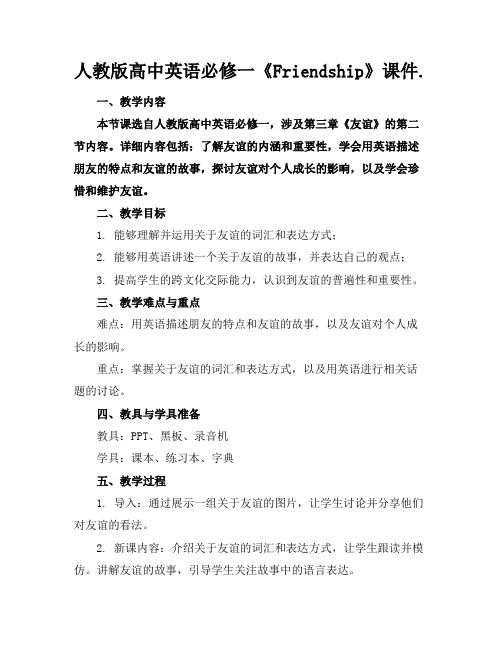
人教版高中英语必修一《Friendship》课件.一、教学内容本节课选自人教版高中英语必修一,涉及第三章《友谊》的第二节内容。
详细内容包括:了解友谊的内涵和重要性,学会用英语描述朋友的特点和友谊的故事,探讨友谊对个人成长的影响,以及学会珍惜和维护友谊。
二、教学目标1. 能够理解并运用关于友谊的词汇和表达方式;2. 能够用英语讲述一个关于友谊的故事,并表达自己的观点;3. 提高学生的跨文化交际能力,认识到友谊的普遍性和重要性。
三、教学难点与重点难点:用英语描述朋友的特点和友谊的故事,以及友谊对个人成长的影响。
重点:掌握关于友谊的词汇和表达方式,以及用英语进行相关话题的讨论。
四、教具与学具准备教具:PPT、黑板、录音机学具:课本、练习本、字典五、教学过程1. 导入:通过展示一组关于友谊的图片,让学生讨论并分享他们对友谊的看法。
2. 新课内容:介绍关于友谊的词汇和表达方式,让学生跟读并模仿。
讲解友谊的故事,引导学生关注故事中的语言表达。
3. 例题讲解:分析一个关于友谊的例题,讲解解题思路和答题技巧。
4. 随堂练习:让学生根据所学的词汇和表达方式,进行相关话题的讨论和写作练习。
5. 小组活动:分组讨论,让学生用英语讲述一个关于友谊的故事,并分享给其他小组。
六、板书设计1. Friendship2. 关键词:friendship, characteristics, story, influence, cherish, maintain3. 重点句型:①How to describe a friend? ②What's the importance of friendship? ③How to cherish and maintain friendship?七、作业设计1. 作业题目:(1)Write a short passage about your best friend, describing his/her characteristics and the story of your friendship.(2)Discuss the influence of friendship on your growth and give examples.2. 答案:八、课后反思及拓展延伸1. 反思:关注学生的学习情况,了解他们在讨论和写作过程中的困难,针对性地进行指导。
新教材 牛津译林版高中英语必修一 Unit 1 Back to school 精品教学课件(共181页)
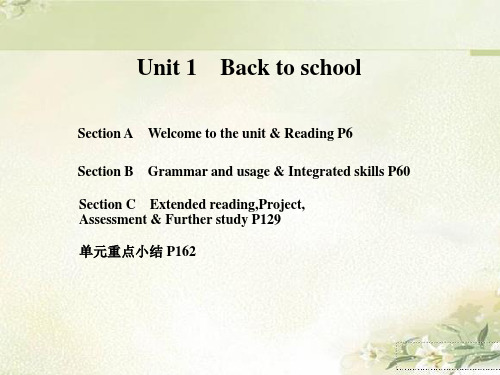
My First Day of High School I was getting ready for my first day of high school in the middle of the summer.I was thinking what I should wear and thinking what my hair and make-up should look like.I got more and more scared① every day. I woke up that morning,excited but nervous② as I would begin my journey of high school.I was so scared for my first day that I got up two hours early.I had to do my hair five times just for it to look perfect.I was trying to make myself look older.I remember how I felt about the 6th graders when I was in the 8th grade.I didn’t want any of the older kids to feel like that about me.I changed my outfit③ about three times.
Ⅰ
Ⅱ
9. path
n.道路,小路;成功的途径
10. positive adj.积极乐观的;良好的,正面的
11. amazing adj.令人大为惊奇的,令人惊喜的→ amazed adj.
高中英语人教版必修一(2019)Unit 3 Reading and Thinking(课件)

Unit 3 Sports and Fitness
Reading and Thinking
Choose your favourite athlete
Learning objectives
➢ Predict the content and type of the text by looking through the pictures a the following words can’t be used to describe Lang Ping?
A. Determined.
B. Curious.
C. Positive.
D. Inspiring.
( A ) Lang Ping believes that ________.
could be played that way. ___I__ Michael Jordan believes that it is important to help others.
Task 2: Careful reading
Activity 1: Read the passage carefully and choose the correct answers.
( D ) What is the same characteristic that makes Lang Ping and Michael Jordan succeed?
A. They are both strong.
B. They can accept failure.
C. They are both athletes.
A. a team can win if they work together
人教版高中英语必修一《Sports and Fitness》PPT课件(第3课时)

Use tag questions to role-play one of the situations below. (P40, Activity 3)
EXAMPLE A: The Sports Day is coming
soon, isn’t it? B: Yes, it is. …
In this class, you will discover how a climber feels about climbing karsts; express your opinions on extreme sports such as rock climbing.
Karsts
Karsts
You’re going to get sick… Oh, what’s that
noise?
is it
Dad: It isn’t a storm coming, _________?
Tom: Yews,ililt yiso!uBut it’s on TV! Dad, come and see,
__________?
Unit 3
Sports and Fitness 第3课时
Learning Objectives
In this class, you will 1. identify meaning, form and function of tag
questions; 2. form correct structure of tag questions; 3. use tag questions in active role-play in context
Karsts are rock formations made of limestone. They have been sculpted by wind and water and millions of years of erosion into these beautiful natural sculptures.
人教版高中英语 必修一 Unit4 《Earthquake---Reading》 课件 (共23张PPT)

Step2 Fast reading
1.Skimming the passage to get the general idea and find out the topic sentence for each paragraph
Skimming Reading comprehension I
The passage mainly talks about a/an _ea_r_t_h_q_u_a_k_e__ that happened in T__a_n_g_sh__a_n_ in _1_9_7_6__.
Reading Comprehension II
1. The earthquake began at ________. A. 3:00 am, June 28, 1976 B. 3:00 am, July 28, 1976 C. 3:42 am, July 28, 1976
2. _________ people were killed or injured in the quake. A. Less than 400,000 B. More than 400,000 C. More than 150,000
Paragraph 1
1.What strange things happened before the earthquake? 1 .water in the village wells rose and fell 2 .well walls developed deep cracks 3 .a smelly gas came out of the cracks 4 . chickens and pigs were too nervous to eat 5.mice ran out of the fields 6.fish jumped out of their bowls and ponds 7. bright lights appeared in the sky 8. the sound of planes could be heard although there
